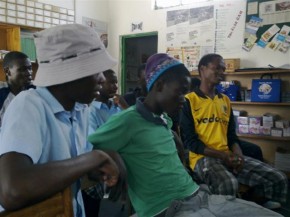Having spent some time in Zimbabwe (since 2010) I have certainly become relaxed and really appreciate this beautiful country. I feel relatively safe, in comparison to many other cities. Arriving at Harare Airport, one is met with helpful staff and no hassle in getting a cab - where else is this the case on the African continent?
A bigger, more important question is whether Zimbabwe is improving for its ordinary citizens and that is much harder to answer. Clearly the country has stabilised in economic and security terms since the crisis of 2008, but there is little 'hard' statistical evidence to track the trends in indicators that measure poverty - or the lack of it.
With support from various agencies, including the EU, UK and in particular USAID, the national statistics agency ZimStats has just released the results from its wide-ranging Demographic and Health Survey (DHS) 2010/11, that is conducted regularly at five yearly intervals. Since the last DHS survey the country has seen huge changes - the disappearance of the Zim dollar and mass migration; and the rollout of ARV drugs for HIV infected people, for example, but what effect has this all had?
Despite the intervening crisis of 2008 it's very welcome to see an overall decline in the adult HIV infection rate from 18% to 15%, although still very high, with one third of women in their 30s and men in their 40s being infected. The good news is that clearly safer sex practices and awareness are helping to protect young Zimbabweans. Campaigns against malaria are also working - the ownership and use of mosquito nets has increased threefold since 2005 and infant mortality has dropped slightly.
However what the statistics also reveal is the deterioration of basic services, which have resumed since 2008 but are still well below the level of a decade ago. Maternal mortality rates have jumped, just as the number of births supported by trained attendants has slumped and nurses have left the country. Primary school attendance has dropped by 4% overall since 2005/6 and is now below the 90% threshold; secondary school attendance has increased slightly but there are still less than half of teenagers in school and that does not bode well at all.

Zimbabwe used to boast proudly of it near universal adult literacy rates, now there are 2% fewer literate young men in their late teens, as opposed to those in their early 20s. A disrupted education has a much less dramatic effect in comparison to the cholera epidemics and chronic food shortages that accompanied the 2008 crisis.
However the impact of young unemployed men lacking basic skills and knowledge can be potentially disastrous, as many other African countries can attest. Rapidly scaling up second change education chances for young Zimbabweans who dropped out of school is one of the key priorities of the Education Transition Fund, a multi donor initiative that is moving on to a new phase with European and UK support, having completed a major textbook distribution campaign in 2011.

2 comments
Comment by Raymond R. Muringani posted on
Ian
After reading a couple of reports you have posted on this website I felt compelled to submit a few comments.Your Incisive descriptions of situations in the schools you visited make very interesting reading. As Education officer for DFID one would wish that the reports you produce after these historical and functional visits were also copied to our Ministry of Education so that the ministry can utilize them in their planning as and when it becomes necessary. It might also help in future for your team to produce video footage of some of the situations you witness in the schools to add visual effect to the reports for whoever is the ultimate overseer of your tour of duty. In fact as you observed when you went out of Harare and Chitungwiza, access to education in Zimbabwe is threatened by the uneven living and working conditions for pupils and teachers in the country respectively. There must be serious consideration of rural allowances for both teachers and pupils in cash and kind. One would suggest something like solar energy( NB H.E.P. is problematic in Zimbabwe) programmes to light up the rural schools and innovate their learning environments while teachers who teach in rural areas should be incentivized so much that teachers would aspire and compete for available teaching posts in the rural areas instead of the urban towns and cities. With support from organisations like DFID and other significant NGOs in the country, the fortunes of our rural communities can be significantly transformed. In our functional literacy projects with our groups of literacy graduates we have observed that our rural folks (especially women) are very industrious and can be depended upon to bring about real change in the patterns o our daily lives provided they can access basic resources for whatever project they set out to do. I want to applaud your reports for publishing the live trends in the country. These reports are very useful for planners and other players in the field. Keep up the good work in Zimbabwe. I shall literally look forward to reading more reports of your visits and assessments of the situation in all parts of the country.
From Raymond Washaya. (Church Education Secretary for an Independent Church in Zimbabwe and also Education Officer for an Adult Literacy Programme ).
Comment by Ian Attfield posted on
Raymond,
Many thanks for your insightful comments, as a matter of course our field observations and media are reported back to both government and donor stakeholders as you suggest.
The resource and financial problems areclear in the rural areas, one of our objectives is to support reforms to the spending of both Government and donors to maximise the benefits for Zimbabwean children.
Yur ideas on solar energy are noted and disucssion with SNV on this promising topic are ongoing. Of course these needs must be weighed against others - not least the outstanding infrastructure and sanitation conditions!